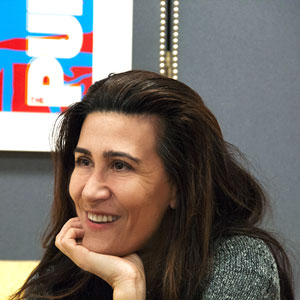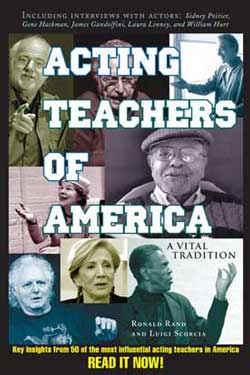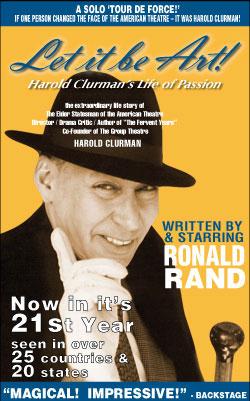Jeanine Tesori
 Ms. Tesori won The Tony Award for Best Original Score with Lisa Kron for the musical, “Fun Home” on Broadway. She also wrote the Tony Award nominated scores for “Twelfth Night” at Lincoln Center, “Thoroughly Modern Millie” with lyrics by Dick Scanlan, “Caroline, or Change” with lyrics by Tony Kushner, “Shrek, The Musical” with lyrics by David Lindsay-Abaire. the production of “Caroline, or Change” at The National Theatre in London received The Olivier Award for Best New Musical. Her 1997 Off-Broadway musical, “Violet” with lyrics by Brian Crawley opened on Broadway in 2014 and garnered four Tony nominations including Best Musical Revival. Ms. Tesori’s operas include “A Blizzard on Marblehead Neck” with a libretto by Tony Kushner performed at Glimmerglass, “The Lion, The Unicorn and Me” with libretto by J.D. McClatchy, performed at Washington D.C.'s Kennedy Center. Her music for plays includes “Mother Courage” directed by George C. Wolfe with Meryl Streep and Kevin Kline, “A Free Man of Color” directed by George C. Wolfe at Lincoln Center Theater, and “Romeo and Juliet.” Ms. Tesori wrote songs for the “Emperor’s New Groove 2: Kronk’s New Groove,” “Wrestling with Angels,” a 2006 Documentary about Tony Kushner, “Shrek the Third,” and three animated Disney DVD's “Mulan II,” “Lilo And Stitch II,” and “The Little Mermaid: Ariel’s Beginning.” her film scores include “Nights in Rodanthe,” and “Every Day You're Not You.” She was cited by ASCAP as the first art female composer to have two new musicals running concurrently on Broadway. Ms. Tesori is the Founding Artistic Director of Encores Off Center at the New York City Center and a lecturer in music at Yale University. She’s the proud parent of Siena Rafter.
Ms. Tesori won The Tony Award for Best Original Score with Lisa Kron for the musical, “Fun Home” on Broadway. She also wrote the Tony Award nominated scores for “Twelfth Night” at Lincoln Center, “Thoroughly Modern Millie” with lyrics by Dick Scanlan, “Caroline, or Change” with lyrics by Tony Kushner, “Shrek, The Musical” with lyrics by David Lindsay-Abaire. the production of “Caroline, or Change” at The National Theatre in London received The Olivier Award for Best New Musical. Her 1997 Off-Broadway musical, “Violet” with lyrics by Brian Crawley opened on Broadway in 2014 and garnered four Tony nominations including Best Musical Revival. Ms. Tesori’s operas include “A Blizzard on Marblehead Neck” with a libretto by Tony Kushner performed at Glimmerglass, “The Lion, The Unicorn and Me” with libretto by J.D. McClatchy, performed at Washington D.C.'s Kennedy Center. Her music for plays includes “Mother Courage” directed by George C. Wolfe with Meryl Streep and Kevin Kline, “A Free Man of Color” directed by George C. Wolfe at Lincoln Center Theater, and “Romeo and Juliet.” Ms. Tesori wrote songs for the “Emperor’s New Groove 2: Kronk’s New Groove,” “Wrestling with Angels,” a 2006 Documentary about Tony Kushner, “Shrek the Third,” and three animated Disney DVD's “Mulan II,” “Lilo And Stitch II,” and “The Little Mermaid: Ariel’s Beginning.” her film scores include “Nights in Rodanthe,” and “Every Day You're Not You.” She was cited by ASCAP as the first art female composer to have two new musicals running concurrently on Broadway. Ms. Tesori is the Founding Artistic Director of Encores Off Center at the New York City Center and a lecturer in music at Yale University. She’s the proud parent of Siena Rafter.
What do you love the most about creating a new show?
I love “putting the concrete” in with the abstract; creating the architecture to a show. I have to figure out what that is. I need to always have the “beginners mind.” No matter how good you are, you have to remember that this show is never been done by you. It’s like a giant crossword puzzle and I have to figure what works. That’s part of the mystery and the joy.
“Fun Home” is a thoroughly amazing experience. How were you first introduced to Alison Bechdel’s book? What made it most exciting and challenging in the development process working with Lisa Kron?
Lisa sent me the book and asked if I would be interested in writing the music. When we met I said: “I have no idea how this can be a musical.” She thought I was turning it down, but that was the reason I wanted very much to do it.

“Fun Home” Musical Stage Company production
As you and Lisa Cron worked on “Fun Home,” was the development process challenging?
Once we began working on it, I knew it would have to be about the bridge between the gap of what people want and what the world will give them. There’s so much one does in that gap. I knew the show would “sing,” but I didn’t know what form it would take. The actual book is like a labyrinth. Alison builds the story in her novel like a corn maze. There’s so many places you jump; it's maddening. It was definitely challenging.
I keep learning not every story has to fit in a classic mode. The story will eventually tell you how it should be told. “The form,” Sondheim said, “is dictated by the context.”
“Fun Home is nonlinear; things can happen at any time. She can be eight years old or jump to forty, it was like grabbing a slippery fish. It came from a lot of experimenting. When we finally saw what we were doing, it came into place. Everything led to the car ride. The narrator becomes involved in the narrative.
How did the performers who included Beth Malone, Michael Cerveris, Judy Kuhn, and Sydney Lucas, enrich the musical?
The great thing about Michael (Cerveris) and Judy (Kuhn) is that they do so much new work, they ask questions during the process as we’re putting it together. Michael understood when he signed up, that the part wasn’t completed. That can be very difficult for a performer. I knew in my heart that the part wasn’t complete so we played some of it for him.
It needed to be clear in the show that Bruce (the father) is a tragic figure, not a villain. If you don't write him responsibly, he can be reduced to something unsavory, terrifying. In denying who he is and who he was, tragedy happens. Everywhere today tragedy can become a legacy. A parent who commits suicide leaves a trail of tears.

Sydney Lucas performs in “Fun Home” during the Tony Awards in New York, June 7, 2015. (photo: Lucas Jackson)
I understand you began early playing the piano, but were on your way to a career in medicine
I began playing the piano at age three and had formal training at about six years old. I took lessons until I was fourteen and then I quit. My mother was a nurse and my father was a doctor; his office was connected to our home. I love science and still do. Musicals actually have a lot of science in them.
When I actually began seeing a lot of theater and coaching at a kids’ theater camp in the Catskills, I went into music. After a year and a half working as a pianist and arranger, I had those moments when I thought I can do this. I felt happy but I didn’t know you could make a living doing it.

Jeanine Tesori
Were there specific writers that inspired you as you develop your craft?
Well, Sondheim is a number one. He’s a great composer and playwright. I studied him and still do. I was classically trained and then went on to play a ton of pop and R&B on a lot of albums when I was working in Nashville for ten years with my mentor. My training was from all over the place. I studied with some wonderful people. I think my ear is very non-judgmental. how I was trained is immensely helpful for what I do. I love Stravinsky and Sondheim.
Stephen Schwartz who wrote “Godspell” and “Pippin” was one of the first to put piano-based grooves in a Broadway show and I can still play most of them. I started doing summer stock shows, then “Gypsy,” “Secret Garden” and “Tommy.”
Then you had to write “Violet.”
I left the city for ten months in order to stop working as a music director. It was hard to say “no” to work. You’re tempted to say “yes” to every gig. Suddenly I was asking myself at twenty-eight, twenty-nine years old, “What do I do now?”
It was very hard to escape to a lighthouse, but I went away to see if I was going to be able to use unstructured time in the rehearsal room. I had to create my own syllabus, to not rely on anyone's past work. And I needed a deadline, so I made one for myself.

“Violet” on Broadway with Joshua Henry, Sutton Foster, and Coin Donnell (photo: (© Joan Marcus)
How have you learned to handle what critics say about your work and your own inner critic?
I think I learned a lot from “Violet.” One review sank it. I was in bed for three days; I was devastated. It changed me. Everything was riding on that one show and I saw what that did to me. I swore I’d never let that happen again I swore I’d always have other things in my life – another show, a life, the passion of activism and the love of friends and family.
Did you particularly feel you were tapping into a deep well inside your creativity?
I think it started with “Twelfth Night,” and definitely with “Violet.” It became: How do you use time to write quickly. In musical theater you have a lot of lead-up time and then you have only three weeks. You have to be a marathon runner and a sprinter.

You’ve had some wonderful collaborators including with Lisa Kron, Dick Scanlan on “Thoroughly Modern Millie,” Tony Kushner on “Caroline, or Change?” – and I imagine it was also a bit challenging with your approach on “Shrek” with David Lindsay Abaire.
Every collaboration reminds me why I hate to work alone. You hopefully impress on each other to be better. I like working with a lot of different writers. I worked with David on our new show and I was nervous tackling and grappling with it.
When David and I wrote “Shrek,” we took on a great hero story, a quest story but the hardest thing was this: Shrek doesn’t want anything or at least he doesn’t think he wants anything. His essence was that of a prince, but his identity was that of an ogre, an ogre who is perfectly happily being alone. But we know that’s a lie, and we travel with him as he finds out the truth, and his true love.
What also made it challenging was that we were writing a story that everyone in the audience already knew, so you have to manage their expectations. Yet, we had a really good time working on the show.

You must also have gotten an enormous amount of satisfaction sharing what you’ve learned when you led the Encores Musical Theatre Series Off Center –
A hundred and fifty percent! I love what I do more than ever. Having been able to be at City Center, championing new work, being an advocate for other people’s work, mentoring and teaching was so meaningful. The students always had a lot of questions and there was so much more that was quantitative… pitch, harmony, tension, but then the qualitative parts. It’s up for grabs how someone sees the world, and that’s the complete joy of it!
(This interview also appears in Ronald Rand’s new book, CREATE! How Extraordinary People Live to Create and Create to Live,” published by Wyatt-Mackenzie Publishing.)

”Thoroughly Modern Millie” 10th year Anniversary with Megan McGinnis, Harriet Harris, Gavin Creel, Sutton Foster, Sheryl Lee Ralph, Marc Kudisch, Darren Lee, and cast (photo: Joseph Marzullo/WENN)









































